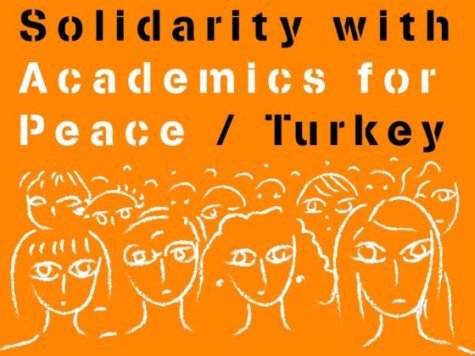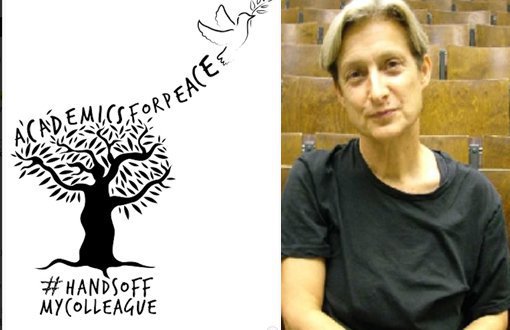Click to read the article in Turkish
Prominent feminist philosopher and queer theoretician, US post-structuralist philosopher Judith Butler and academic Başak Ertür wrote about the trial of Academics for Peace on The Guardian daily newspaper.
Academics and rights defenders were called for solidarity all over the world through the petition and financial support campaigns with the slogan “Hands Off Our Colleagues”.
“A total of 148 trials are scheduled through to May 2018, with new trials expected to be announced in the near future. Each focuses on a single individual, but the indictment is the same for all of them”, stated the article and underlined that the statements in the declaration advocate fundamental democratic rights.
Click here to read the full article
“What is the substance of the indictments?” asked the article adding: “The public prosecutor accuses the academics of “making propaganda for a terrorist organisation” under article 7/2 of the Turkish anti-terror act”.
The article briefly read:
“The petition’s call to cease violence and comply with international law is taken by the state to be ‘propaganda’ for the PKK. The indictment offers no careful reading of the actual petition.
“Most strange, then, that the indictment begins with the petition, citing it verbatim, and then concludes, without any argument, that it is a declaration that supports the PKK.
“This is a willful distortion and reversal of the clear meaning of the petition. In fact, the petition calls for a peaceful settlement, therefore it clearly does not affirm the violent aims and actions of any Kurdish group. And yet that word “peace” becomes code for ‘terrorism’”.
“The government accuses the peace petitioners of making ‘war’”
“The use of media to circulate the claims of the petition internationally becomes an item in the indictment itself. The indictment claims that there were no massacres and that no curfews led to perilous food shortages, even though those facts are corroborated by Amnesty International and Human Rights Watch. Thus the petition is cast by the indictment as “false news”.
“In this mirror-play, the indictment renames state violence as necessary security for the “residents” in Kurdish areas, dismissing the petition’s appeal to international law to protect the lives of those very “residents” as defamatory propaganda.
“The proponents of the petition are accused of “spread(ing) false, baseless and malicious news through disinformation and information pollution, target(ing) the Republic of Turkey, its government, its army and security forces.” They accuse the peace petitioners of making “war” through the media, but their war is now taking shape in a series of show trials, made for mass media consumption”.

“International solidarity is once again crucial”
“Curiously, the call to include international observers to make sure human rights are honoured and to participate in peace talks is interpreted in the indictment as ‘an assault’ on Turkish state sovereignty. Recep Tayyip Erdoğan, the president, initiated this line of thinking when he lambasted the petition’s call for international observers as the product of a “mandatist” mentality, a misrepresentation that is most provocative in a world where international norms of human rights have indeed been mobilised for interventionist aims, often with catastrophic consequences.
“International solidarity is once again crucial at this time when our colleagues in Turkey are facing criminal trials. It can take the form of supporting dismissed scholars financially, and calling on professional organisations and higher education institutions at both the national and international level to undersign and heed our colleagues’ call for solidarity, whether through a targeted boycott or a different campaign”.
You can access to the campaigns making call for solidarity with the Academics for Peace through the links below. (PT/TK)
CLICK-Solidarity with Purged Academics for Peace in Turkey
CLICK - Academic Boycott of Turkey
CLICK - Open Letter: Solidarity with Turkish Academics suffering state prosecution




